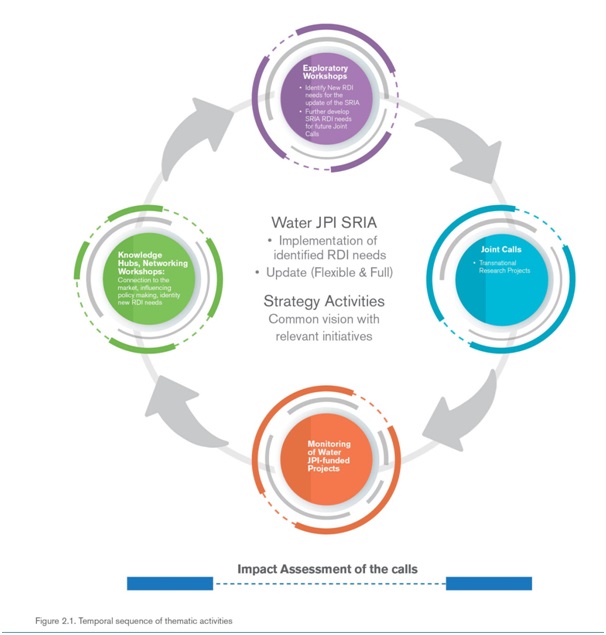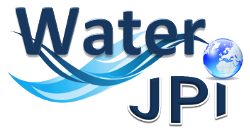WATER JPI Activities
Thematic activities are activities implementing specific RDI needs of the Water JPI SRIA

Exploratory Workshops
Exploratory workshops are thematic workshops to gather relevant experts in a specific topic, who will present and discuss their findings to other experts and stakeholders (end-users, policymakers and industry) as well as identifying knowledge gaps in a particular theme. The expected outputs include planning of joint or cofounded joint calls for proposals in a specific topic, their focus and urgency (i.e. when the call should be launched) and further elaboration of RDI needs. These workshops would typically take place before the joint call activities.
Read more on the past Exploratoy Workshops:
2016 Exploratory Workshop on “Closing the Water Cycle Gap”
2017 Exploratory Workshop on “Improving Ecosystem Sustainability and Human Well-being"
2017 Exploratory Workshop on "Water JPI SRIA & UN SDGs Workshop"
Joint Calls
Transnational joint calls are competitive calls. They can be funded with or without EC co-funding. Interested Water JPI members can take part as funding agencies in the call and so can other possible partners. The calls will result in the funding of transnational projects. To date, the type of projects funded can be described by:
- research spectrum: basic to applied research;
- indicative technology readiness levels (TRLs): up to TRL 4;
- indicative duration: 2–3 years; and
- indicative requested budget: up to €1.5 million.
These joint calls will promote multi-disciplinary work and encourage proposals with fundamental and/or applied approaches, stimulate the mobility of researchers and research infrastructure sharing within the consortia, and enhance collaborative research and innovation during the project’s life and beyond.
Monitoring of Water JPI-funded projects
Water JPI-funded projects will be monitored following light management procedures. Research Project Consortia are required to attend the kick-off, mid-term review and final review meetings. Progress will be monitored by a follow-up group (composed of selected experts) on behalf of the call steering committee (national funding agencies involved in a specific call). In addition, Water JPI projects are encouraged to follow open data and open access guidelines. An impact assessment of the projects funded under a specific call will be carried out once the projects are completed. Networking workshops (alignment of on-going transnational and national projects)
Networking workshops will be thematic one-day workshops to foster an exchange of information among the projects, finding synergies and means of collaboration, discussing how project outcomes can be targeted at stakeholders and exploring the formation of future consortia. These workshops typically follow joint call activities. They will also contribute to the strategy activities of the Water JPI.
Read more on the 2016 Networking Workshop on “Emerging pollutants”.
Knowledge hubs (alignment of research & innovation communities & activities on dedicated thematic areas)
Knowledge hubs are thematic networks consisting of selected research groups within a defined scientific area targeted at stakeholders. These knowledge hubs are typically set up following joint call activities and research and innovation projects. In addition to improved communication and networking with stakeholders and the scientific community, the added value of the knowledge hub instrument includes establishing a critical mass of research and technological excellence, integration and sharing of knowledge, infrastructures, data and modelling tools, training and capacity building.
They also feed into the strategic activities of the Water JPI, by contributing to the transfer of new knowledge and experiences to final end-users.
Read more on: Water JPI Knowledge Hub , Water JPI Knowledge Hub on Contaminants of Emerging Concerns and Water JPI International Knowledge Hub dedicated to the UN Sustainable Development Goals.
TAP Thematic annual programming (alignment of new national projects)
Thematic annual programming (TAP) consists of coordinated national calls. Each participating funding organisation would include the same topic in their own national calls. A percentage of the national project budget (7–10% of the total budget) would be dedicated to networking activities with the other projects funded under these coordinated calls in the participating countries; other relevant national projects that are already on-going could also be included. Coordinators of the selected projects will have to participate in annual working meetings to exchange information on approaches, methods, data (exchange) and results. This instrument will also contribute to the strategy activities of the Water JPI. The added value includes developing synergies, international cooperation and coordination between the individual projects and this should lead to a greater impact at the European level as well as to creating critical mass, addressing research gaps and avoiding duplication.
Read more on the first TAP Water action
Strategic activities
Strategy activities on a specific SRIA theme will aim to prepare a common vision between the Water JPI and other relevant initiative(s) in that specific area. Dedicated workshops will be organised.
Read more on the first Common Vision workshop between the Water and FACCE JPIs.
